中考英语语法(内含音频讲解)第13讲--状语从句课件(56ppt)
文档属性
| 名称 | 中考英语语法(内含音频讲解)第13讲--状语从句课件(56ppt) |  | |
| 格式 | rar | ||
| 文件大小 | 3.4MB | ||
| 资源类型 | 教案 | ||
| 版本资源 | 通用版 | ||
| 科目 | 英语 | ||
| 更新时间 | 2012-01-30 11:01:20 | ||
图片预览


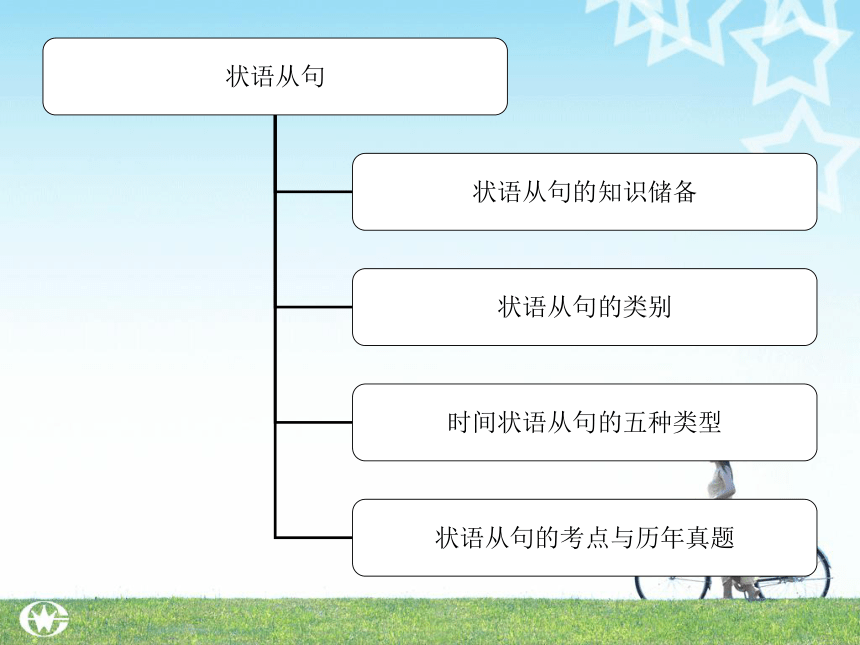


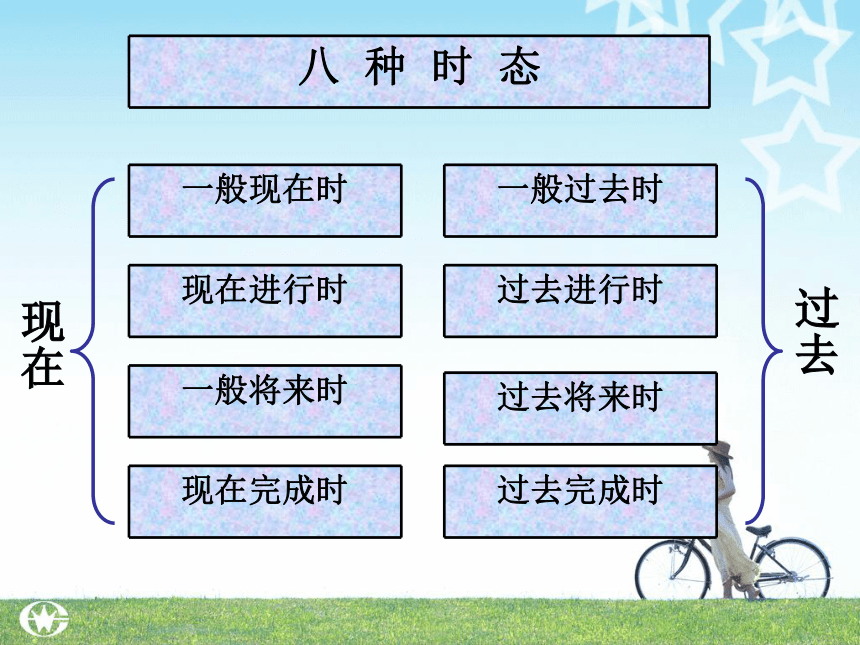
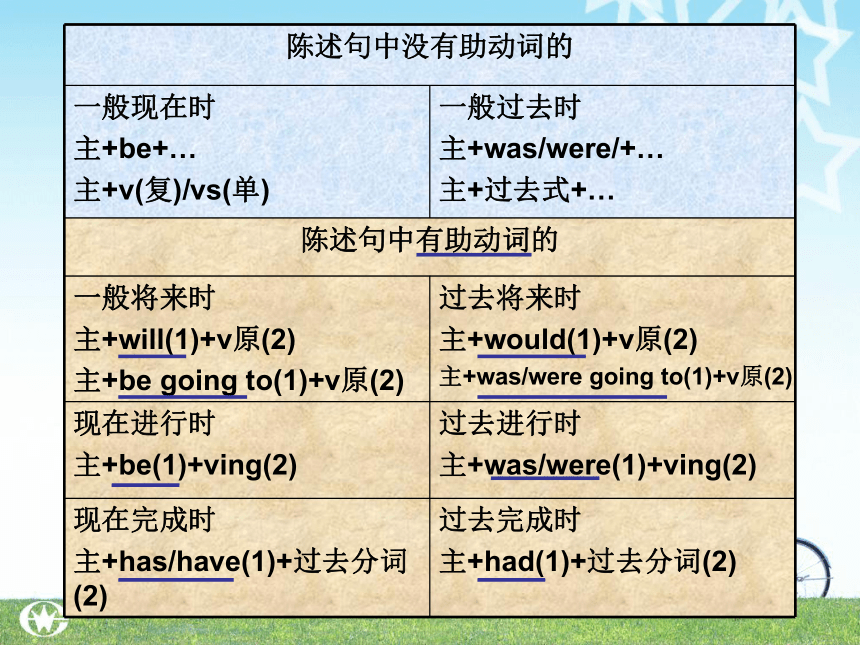
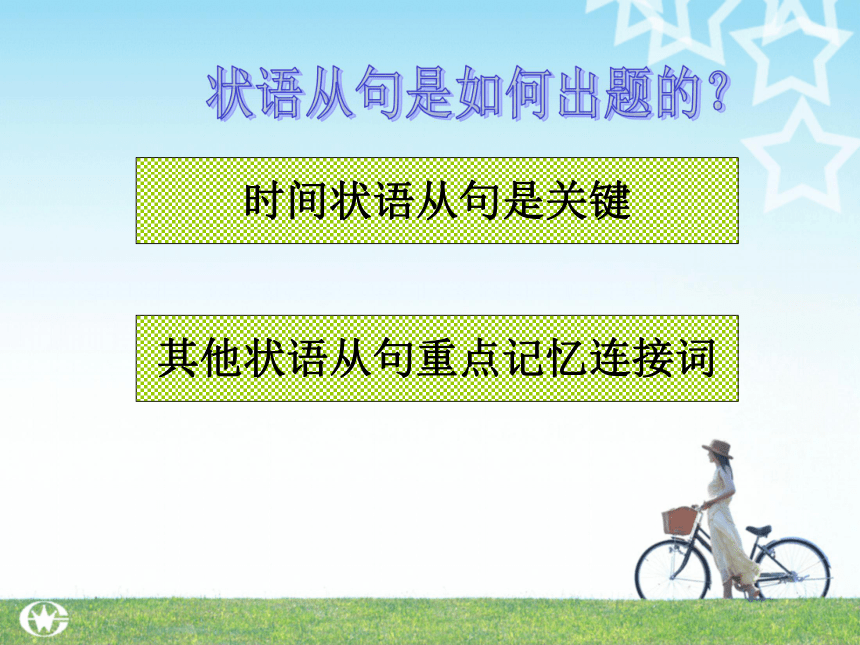


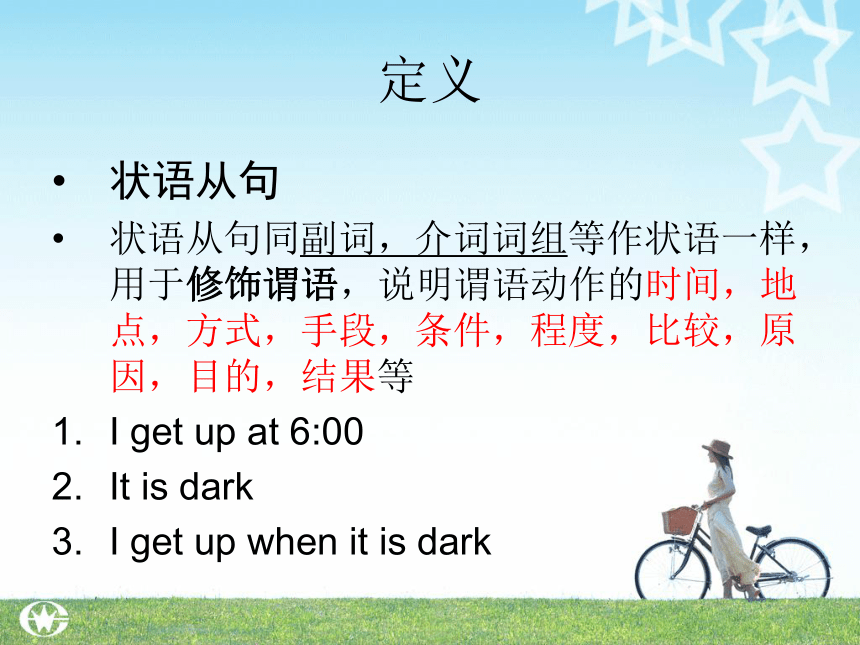

文档简介
(共56张PPT)
状语从句
状语从句的知识储备
时间状语从句的五种类型
状语从句的考点与历年真题
状语从句的类别
八 种 时 态
一般现在时
一般过去时
现在进行时
过去进行时
一般将来时
过去将来时
现在完成时
过去完成时
陈述句中没有助动词的
一般现在时
主+be+…
主+v(复)/vs(单) 一般过去时
主+was/were/+…
主+过去式+…
陈述句中有助动词的
一般将来时
主+will(1)+v原(2)
主+be going to(1)+v原(2) 过去将来时
主+would(1)+v原(2)
主+was/were going to(1)+v原(2)
现在进行时
主+be(1)+ving(2) 过去进行时
主+was/were(1)+ving(2)
现在完成时
主+has/have(1)+过去分词(2) 过去完成时
主+had(1)+过去分词(2)
时间状语从句是关键
其他状语从句重点记忆连接词
表示时间、地点、原因、目的…
We sleep at night at home.
必须符合“从句的三个必须”
必须是句子;必须有连接词;必须是陈述句
请参考本网站“简单句结构---主谓宾”、
“从句基础篇—从句的三个必须”视频
用一个句子充当状语成分,那个句子
就是状语从句。
定义
状语从句
状语从句同副词,介词词组等作状语一样,用于修饰谓语,说明谓语动作的时间,地点,方式,手段,条件,程度,比较,原因,目的,结果等
I get up at 6:00
It is dark
I get up when it is dark
状语从句分类
表示时间
表示地点
表示原因
表示结果
表示目的
表示条件
表示让步
表示比较
返回
表示时间
一、时间状语从句
When, as ,while,
before, after,
till, Until,
as soon as,
The moment, the minute, the first time…. (名词性短语)
E.G.
When/As he was eating his breakfast, he heard the door bell ring.
While I was reading, he was playing.
3. The mother didn't go to bed until her little daughter returned home last night. 昨晚母亲等到她的小女儿回家才睡觉。
表示地点
二、地点状语从句
引导地点状语从句的主要有:where, wherever及- where构成的复合词。
EG:
We shall go where people are kind.
Just stay where you are.
We received a warm welcome everywhere we arrived.
我们每到一个地方都受到了热烈的欢迎。
表示原因
三、原因状语从句
最常用的连词是:
because,
since,
as,
now (that)等
because, as, since, for
语气 位置 意义 because 最强 前或后 “原因”;表客观因果关系;回答“” as 较强 前 “由于”;把众人所知的事实当作理由 since 较弱 前 “既然”;就对方陈述的事实作为理由 for 最弱 后 “理由”;对某一事实进行推断的理由
注:上面所说的“前”,指从句在主句之前;“后”,指从句在主句之后。
EG:
He is absent today because he was ill.
As it is snowing,we shall not go out.
You couldn’t see him, for he
wasn’t there.(不句首)
4. Since you are ill, I will go alone.
表示结果
四、结果状语从句
可以由
so that,
so...that,
such...that
so that, so…that, such…that
so that “以便”、“结果”表目的和结果。
注意:在从句中有情态动词表目的。无情态动词表结果。 so…that “如此的…以致于”表结果。该结构常见于: 1.so+形/副+that 2.so+形+a(an)+单数名词+that 3.so+many/much+复数名词(不可数名词)+that
such…that “如此的…以致于”表结果。该结构常见于: 1.such+a(an)+形+名词+that 2.such+形+复数名词/不可数名词+that
E.G.
He was so angry that he left the room without a word. 他很生气,一句话不说就离开了房间。
It is such a heavy box that nobody can move it.
The box is so heavy that nobody can move it.
The box is so heavy as nobody can move .
I didn’t go early, so that I didn’t get a seat.
表示目的
四、目的状语从句
主要的引导词有:
so that,
in order that,
目的状语从句常常含有情态动词。
E.G.
They are hurrying so that / in order that they may not miss the train. 他们为了赶上火车而匆匆忙忙。
He works hard in order that / so that he can serve his country well.
表示条件
五、条件状语从句
最常用的引导词有:
if, if only(if 的强调式),
unless (= if not),
as long as, so long as
E.G.
As long as I live, I shall work hard.
You can’t learn it well unless you work hard.
If you want to know ,I can tell you.
表示让步
六、让步状语从句
主要的引导词有:
though, although,as
even if, even though
however, Whatever , whenever等
though, although, as,
though, although在句首表“尽管”两者都可以用。但句后不能再用but。
下列情况只能用though: ▲ as though (=as if);
even if (=even though) ▲ 在句末表示“然而”
as表示“尽管”,从句的表语、状语等成分要倒装。
whatever, however, wherever, whenever
它们是what, how, where, when的强势语气。分别等于:
no matter what, no matter how no matter where, no matter when
E.G.
I won’t mind even if (though) he doesn’t come.
Though it was cold, she went out without an overcoat.
Young as/though he is, he knows a lot.
Whether it shines or rains, I will go.
No matter who / whoever comes here, I will not let him in.
you can take whatever you like.
表示比较
八、比较状语从句
主要由
than,
as...as,
the more…the more
这类从句常常有一些成分没有表示出来:
E.G.
The more you eat, the fatter you are.
John is less clever than Tom.
He is not so/as clever as his brother.
前引:根据主从句的三种时间关系,分为主
从句同时发生、主从句都没有发生、主从句一前一后发生三类句型,
每种句型分别对应独特的句式
What were you doing when the UFO arrived
What are you doing when the UFO arrives
I would leave if he came.
I will leave if he comes.
The train had been away when I arrived.
过去配过去
过去配过去
现在配现在
现在配现在
前引:根据主从句的三种时间关系,分为主
从句同时发生、主从句都没有发生、主从句一前一后发生三类句型,
每种句型分别对应独特的句式
过去类:….过去进行 when 一般过去
现在类:…现在进行… when 一般现在
过去类:过去将来 when 一般过去
现在类:一般将来when 一般现在
过去完成 when 一般过去
练习—翻译
1当小明做作业时,他的妈妈在做饭.
Xiaoming’s mom was cooking when he did his homework.
2那天,当小明做作业时,他的妈妈在做饭
That day, Xiaoming’s mom was cooking when he did his homework.
3他一来我就走(as soon as)
I will leave as soon as he comes.
4那天,他一来我就走(as soon as)
That day, I would leave as soon as he came.
5当他出门时,雨已经下了两个小时了.
It had been rainy for 2 hours when he went out.
1. ______ they had worked for along time, everyone looked tired.
A. While B. After
C. Unless D. For
2. He has been a teacher ______ he came to the country.
A. since B. until
C. as D. when
3. He has had to cook by himself ______ his mother went on business to Beijing.
A. during B. since
C. after D.when
4. It is ten years ______ I saw you last time.
A. since B. when
C. that D. if
5 He always thinks I'm wrong, ______ I may say.
A. no matter whatever B. whatever
C. what D. that
6. ______ , Mother will wait for him to have dinner together.
A. However late is he
B. However he is late
C. However is he late
D. However late he is
7. You should run the machine ______ the workers has shown you.
A. as B. and
C. but D.so
8. You shall have the book ______ I have read it.
A. so that B. though
C. as soon as D. since
9. The man put on a overcoat ______ keep himself warm.
A. that B. so that to
C. in order that D.in order to
10. He has changed so much ______ I can hardly recognize him.
A. as B. so that
C. that D.but
11. Wounded ______ he was, he refused to come back from the front.
A. as B. though
C. although D.both A and B
12. We'll both wait here ______ you get back.
A. so that B. that
C. until D.for
13. Some people want to go hunting, ______ others want to go finishing.
A. or B. because
C. while D. since
14. Bad habits, ______ formed, are difficult to get rid of.
A. and B. once
C. or D. but
15. You must get up early in the morning, ______ we'll have to start out without you.
A. and B. or
C. but D. so that
16. Would you please wait ______ I come back.
A. if B. when
C. because D.till
17. He couldn't come ______ he wanted to.
A. as B. because
C. although D.for
18. ______ you gave a party and no one come, what would you do
A. Although B. If
C. Unless D.When
19. You may borrow the book ______ you keep it clean.
A. as long as B. when
C. after D. unless
20. John plays football ______ , if not better than, David.
A. as well B. as well as
C. so well D. so well as
(三)状语从句—中考真题
1. it’s difficult to make her dream come true, she never gives up.
A. Though B. Unless C. Because D. If
2. It’s quite common in Britain to say “Thank you” to the drivers people get off the bus.
A.After B. since C. until D. when
3. Your dream won’t come true you know what your dream is.
A.After B. unless C. while D. since
4. ----How was your climbing on Mount Tai
-----I didn’t believe I could do it I got to the top.
A. until B. unless C.After D. when
5. I arrived at the airport the plane had taken off.
A.After B. while C. when D. before
6. the water was cold, Wei Qinggang jumped into it to save others.
A.Although B. When
C. If D. Because
7. We won’t start the meeting our teacher arrives.
A. though B. until C. while D. or
8. We will have no water to drink we don’t protect the earth.
A. until B. before C. though D. if
9. Jane, please turn off the lights you leave the classroom.
A.After B. before C. until D. but
10. We have to get up at 7:15 tomorrow morning, ___we will be late for the 7:40 train.
A. before B. or C. if D. so
11. My grandfather is very old, he never stops learning.
A. than B. though C. but D. unless
12. ---Where was your brother at this time last night
---He was writing an e-mail I was watching TV at home.
A.As soon as B.After C. until D. while
13. I’ll park the car at Pacific Place, the car park there is full.
A. unless B. if C. when D.After
14. they arrived early at the airport, they nearly missed their fight.
A .If B. Because C.As soon as D.Although
15. We have been good friends we joined the same ping-pong team.
A.After B. before C. since D. until
16. Bill, you have finished your homework, let’s go to fly kites now.
A. though B.After
C. before D. since
(三)状语从句—中考真题
1.A.考点分析:though引导让步状语从句,“虽然”,不与but连用,意思可表示 “虽然…但是”,故不与转折意思的关系词连用,并且一般置于句首。
2.D.考点分析:when引导时间状语从句,一般与过去的时间状语连用,“当…的时候”,
3.B.考点分析:unless “除非”, 除非你知道自己的梦想是什么,否则你的梦想将不会实现。
4.C.考点分析:or “否则”,汤姆,远离火,否则你将被烧伤。
5.A.考点分析:not…..until“直到…才”,直到我到山顶,我才相信我能够爬到山顶,否则我是不相信的。
6.B.考点分析:or “否则”,小心,否则你将在考试中犯错误。
7.A.考点分析:After“…以后”,与过去时间状语连用.我到飞机场的时候,飞机已经起飞了。
8.A.考点分析:Although引导让步状语从句,表示虽然…但是,不与but连用。
9.D.考点分析:你愿意和我一起去参加音乐会吗?我想去,但恐怕没有时间。由句意可知前后是转折关系。
10.B.考点分析:直到老师到了我们才会开始开会。Not …..until….直到…才
11.D.考点分析:如果我们不保护地球,我将没有水喝。If如果。
12.B.考点分析:钱是重要的,但它并不能买到一切。前后句子之间存在着转折关系,要用but.
13.B.考点分析:Jane, 离开教室前请关灯。Before在…之前。
14.D.考点分析:我认为你叔叔的确不喜欢看电视连续剧。是的,但他仍然看这部剧。此处表示转折,用but.
15.C.考点分析:你和你弟弟有一人可以加入我们的队伍,因为我们只想要你们中的一个人。either….nor…表示两者中的任何一个,表示肯定。
16.B.考点分析:钱很重要,但它不是最重要的东西。前后是转折关系。
17.B.考点分析:明早我们必须7:15起床,不然就赶不上7:40的火车了。
18.C.考点分析:虽然我爷爷很老了,但是他从来没有停止过学习。“very old….never stops learning”表示转折关系,用but.
19.D.考点分析:昨天晚上的这个时候你弟弟在哪里啊? 他正在写邮件,而我正在家里看电视。While表对比转折。
20.A.考点分析:除非那里的停车场都满了,否则我就把车停在“太平洋地区”。
21.B.考点分析:这些孩子们写的故事书太差了。它们既无趣又不刺激。Neither….nor…..两者中的任何一个都不。
22.D.考点分析:尽管它们很早就到了机场,但还是差一点错过飞机。although虽然,尽管。
23.C.考点分析:自从加入了同一个兵乓球队我们就一直是好朋友。本题是现在完成时,含有since的主句通常用现在完成时,since后接一个一般过去时的句子或一个过去的时间点。
24.B.考点分析:或者莉莉或者我可以跟你去,因为其中有一个人要在家帮爸爸干花园里的活。
25.D.考点分析:比尔,既然你已经完成作业,现在咱们去.since 自从,因为,既然。
状语从句
状语从句的知识储备
时间状语从句的五种类型
状语从句的考点与历年真题
状语从句的类别
八 种 时 态
一般现在时
一般过去时
现在进行时
过去进行时
一般将来时
过去将来时
现在完成时
过去完成时
陈述句中没有助动词的
一般现在时
主+be+…
主+v(复)/vs(单) 一般过去时
主+was/were/+…
主+过去式+…
陈述句中有助动词的
一般将来时
主+will(1)+v原(2)
主+be going to(1)+v原(2) 过去将来时
主+would(1)+v原(2)
主+was/were going to(1)+v原(2)
现在进行时
主+be(1)+ving(2) 过去进行时
主+was/were(1)+ving(2)
现在完成时
主+has/have(1)+过去分词(2) 过去完成时
主+had(1)+过去分词(2)
时间状语从句是关键
其他状语从句重点记忆连接词
表示时间、地点、原因、目的…
We sleep at night at home.
必须符合“从句的三个必须”
必须是句子;必须有连接词;必须是陈述句
请参考本网站“简单句结构---主谓宾”、
“从句基础篇—从句的三个必须”视频
用一个句子充当状语成分,那个句子
就是状语从句。
定义
状语从句
状语从句同副词,介词词组等作状语一样,用于修饰谓语,说明谓语动作的时间,地点,方式,手段,条件,程度,比较,原因,目的,结果等
I get up at 6:00
It is dark
I get up when it is dark
状语从句分类
表示时间
表示地点
表示原因
表示结果
表示目的
表示条件
表示让步
表示比较
返回
表示时间
一、时间状语从句
When, as ,while,
before, after,
till, Until,
as soon as,
The moment, the minute, the first time…. (名词性短语)
E.G.
When/As he was eating his breakfast, he heard the door bell ring.
While I was reading, he was playing.
3. The mother didn't go to bed until her little daughter returned home last night. 昨晚母亲等到她的小女儿回家才睡觉。
表示地点
二、地点状语从句
引导地点状语从句的主要有:where, wherever及- where构成的复合词。
EG:
We shall go where people are kind.
Just stay where you are.
We received a warm welcome everywhere we arrived.
我们每到一个地方都受到了热烈的欢迎。
表示原因
三、原因状语从句
最常用的连词是:
because,
since,
as,
now (that)等
because, as, since, for
语气 位置 意义 because 最强 前或后 “原因”;表客观因果关系;回答“” as 较强 前 “由于”;把众人所知的事实当作理由 since 较弱 前 “既然”;就对方陈述的事实作为理由 for 最弱 后 “理由”;对某一事实进行推断的理由
注:上面所说的“前”,指从句在主句之前;“后”,指从句在主句之后。
EG:
He is absent today because he was ill.
As it is snowing,we shall not go out.
You couldn’t see him, for he
wasn’t there.(不句首)
4. Since you are ill, I will go alone.
表示结果
四、结果状语从句
可以由
so that,
so...that,
such...that
so that, so…that, such…that
so that “以便”、“结果”表目的和结果。
注意:在从句中有情态动词表目的。无情态动词表结果。 so…that “如此的…以致于”表结果。该结构常见于: 1.so+形/副+that 2.so+形+a(an)+单数名词+that 3.so+many/much+复数名词(不可数名词)+that
such…that “如此的…以致于”表结果。该结构常见于: 1.such+a(an)+形+名词+that 2.such+形+复数名词/不可数名词+that
E.G.
He was so angry that he left the room without a word. 他很生气,一句话不说就离开了房间。
It is such a heavy box that nobody can move it.
The box is so heavy that nobody can move it.
The box is so heavy as nobody can move .
I didn’t go early, so that I didn’t get a seat.
表示目的
四、目的状语从句
主要的引导词有:
so that,
in order that,
目的状语从句常常含有情态动词。
E.G.
They are hurrying so that / in order that they may not miss the train. 他们为了赶上火车而匆匆忙忙。
He works hard in order that / so that he can serve his country well.
表示条件
五、条件状语从句
最常用的引导词有:
if, if only(if 的强调式),
unless (= if not),
as long as, so long as
E.G.
As long as I live, I shall work hard.
You can’t learn it well unless you work hard.
If you want to know ,I can tell you.
表示让步
六、让步状语从句
主要的引导词有:
though, although,as
even if, even though
however, Whatever , whenever等
though, although, as,
though, although在句首表“尽管”两者都可以用。但句后不能再用but。
下列情况只能用though: ▲ as though (=as if);
even if (=even though) ▲ 在句末表示“然而”
as表示“尽管”,从句的表语、状语等成分要倒装。
whatever, however, wherever, whenever
它们是what, how, where, when的强势语气。分别等于:
no matter what, no matter how no matter where, no matter when
E.G.
I won’t mind even if (though) he doesn’t come.
Though it was cold, she went out without an overcoat.
Young as/though he is, he knows a lot.
Whether it shines or rains, I will go.
No matter who / whoever comes here, I will not let him in.
you can take whatever you like.
表示比较
八、比较状语从句
主要由
than,
as...as,
the more…the more
这类从句常常有一些成分没有表示出来:
E.G.
The more you eat, the fatter you are.
John is less clever than Tom.
He is not so/as clever as his brother.
前引:根据主从句的三种时间关系,分为主
从句同时发生、主从句都没有发生、主从句一前一后发生三类句型,
每种句型分别对应独特的句式
What were you doing when the UFO arrived
What are you doing when the UFO arrives
I would leave if he came.
I will leave if he comes.
The train had been away when I arrived.
过去配过去
过去配过去
现在配现在
现在配现在
前引:根据主从句的三种时间关系,分为主
从句同时发生、主从句都没有发生、主从句一前一后发生三类句型,
每种句型分别对应独特的句式
过去类:….过去进行 when 一般过去
现在类:…现在进行… when 一般现在
过去类:过去将来 when 一般过去
现在类:一般将来when 一般现在
过去完成 when 一般过去
练习—翻译
1当小明做作业时,他的妈妈在做饭.
Xiaoming’s mom was cooking when he did his homework.
2那天,当小明做作业时,他的妈妈在做饭
That day, Xiaoming’s mom was cooking when he did his homework.
3他一来我就走(as soon as)
I will leave as soon as he comes.
4那天,他一来我就走(as soon as)
That day, I would leave as soon as he came.
5当他出门时,雨已经下了两个小时了.
It had been rainy for 2 hours when he went out.
1. ______ they had worked for along time, everyone looked tired.
A. While B. After
C. Unless D. For
2. He has been a teacher ______ he came to the country.
A. since B. until
C. as D. when
3. He has had to cook by himself ______ his mother went on business to Beijing.
A. during B. since
C. after D.when
4. It is ten years ______ I saw you last time.
A. since B. when
C. that D. if
5 He always thinks I'm wrong, ______ I may say.
A. no matter whatever B. whatever
C. what D. that
6. ______ , Mother will wait for him to have dinner together.
A. However late is he
B. However he is late
C. However is he late
D. However late he is
7. You should run the machine ______ the workers has shown you.
A. as B. and
C. but D.so
8. You shall have the book ______ I have read it.
A. so that B. though
C. as soon as D. since
9. The man put on a overcoat ______ keep himself warm.
A. that B. so that to
C. in order that D.in order to
10. He has changed so much ______ I can hardly recognize him.
A. as B. so that
C. that D.but
11. Wounded ______ he was, he refused to come back from the front.
A. as B. though
C. although D.both A and B
12. We'll both wait here ______ you get back.
A. so that B. that
C. until D.for
13. Some people want to go hunting, ______ others want to go finishing.
A. or B. because
C. while D. since
14. Bad habits, ______ formed, are difficult to get rid of.
A. and B. once
C. or D. but
15. You must get up early in the morning, ______ we'll have to start out without you.
A. and B. or
C. but D. so that
16. Would you please wait ______ I come back.
A. if B. when
C. because D.till
17. He couldn't come ______ he wanted to.
A. as B. because
C. although D.for
18. ______ you gave a party and no one come, what would you do
A. Although B. If
C. Unless D.When
19. You may borrow the book ______ you keep it clean.
A. as long as B. when
C. after D. unless
20. John plays football ______ , if not better than, David.
A. as well B. as well as
C. so well D. so well as
(三)状语从句—中考真题
1. it’s difficult to make her dream come true, she never gives up.
A. Though B. Unless C. Because D. If
2. It’s quite common in Britain to say “Thank you” to the drivers people get off the bus.
A.After B. since C. until D. when
3. Your dream won’t come true you know what your dream is.
A.After B. unless C. while D. since
4. ----How was your climbing on Mount Tai
-----I didn’t believe I could do it I got to the top.
A. until B. unless C.After D. when
5. I arrived at the airport the plane had taken off.
A.After B. while C. when D. before
6. the water was cold, Wei Qinggang jumped into it to save others.
A.Although B. When
C. If D. Because
7. We won’t start the meeting our teacher arrives.
A. though B. until C. while D. or
8. We will have no water to drink we don’t protect the earth.
A. until B. before C. though D. if
9. Jane, please turn off the lights you leave the classroom.
A.After B. before C. until D. but
10. We have to get up at 7:15 tomorrow morning, ___we will be late for the 7:40 train.
A. before B. or C. if D. so
11. My grandfather is very old, he never stops learning.
A. than B. though C. but D. unless
12. ---Where was your brother at this time last night
---He was writing an e-mail I was watching TV at home.
A.As soon as B.After C. until D. while
13. I’ll park the car at Pacific Place, the car park there is full.
A. unless B. if C. when D.After
14. they arrived early at the airport, they nearly missed their fight.
A .If B. Because C.As soon as D.Although
15. We have been good friends we joined the same ping-pong team.
A.After B. before C. since D. until
16. Bill, you have finished your homework, let’s go to fly kites now.
A. though B.After
C. before D. since
(三)状语从句—中考真题
1.A.考点分析:though引导让步状语从句,“虽然”,不与but连用,意思可表示 “虽然…但是”,故不与转折意思的关系词连用,并且一般置于句首。
2.D.考点分析:when引导时间状语从句,一般与过去的时间状语连用,“当…的时候”,
3.B.考点分析:unless “除非”, 除非你知道自己的梦想是什么,否则你的梦想将不会实现。
4.C.考点分析:or “否则”,汤姆,远离火,否则你将被烧伤。
5.A.考点分析:not…..until“直到…才”,直到我到山顶,我才相信我能够爬到山顶,否则我是不相信的。
6.B.考点分析:or “否则”,小心,否则你将在考试中犯错误。
7.A.考点分析:After“…以后”,与过去时间状语连用.我到飞机场的时候,飞机已经起飞了。
8.A.考点分析:Although引导让步状语从句,表示虽然…但是,不与but连用。
9.D.考点分析:你愿意和我一起去参加音乐会吗?我想去,但恐怕没有时间。由句意可知前后是转折关系。
10.B.考点分析:直到老师到了我们才会开始开会。Not …..until….直到…才
11.D.考点分析:如果我们不保护地球,我将没有水喝。If如果。
12.B.考点分析:钱是重要的,但它并不能买到一切。前后句子之间存在着转折关系,要用but.
13.B.考点分析:Jane, 离开教室前请关灯。Before在…之前。
14.D.考点分析:我认为你叔叔的确不喜欢看电视连续剧。是的,但他仍然看这部剧。此处表示转折,用but.
15.C.考点分析:你和你弟弟有一人可以加入我们的队伍,因为我们只想要你们中的一个人。either….nor…表示两者中的任何一个,表示肯定。
16.B.考点分析:钱很重要,但它不是最重要的东西。前后是转折关系。
17.B.考点分析:明早我们必须7:15起床,不然就赶不上7:40的火车了。
18.C.考点分析:虽然我爷爷很老了,但是他从来没有停止过学习。“very old….never stops learning”表示转折关系,用but.
19.D.考点分析:昨天晚上的这个时候你弟弟在哪里啊? 他正在写邮件,而我正在家里看电视。While表对比转折。
20.A.考点分析:除非那里的停车场都满了,否则我就把车停在“太平洋地区”。
21.B.考点分析:这些孩子们写的故事书太差了。它们既无趣又不刺激。Neither….nor…..两者中的任何一个都不。
22.D.考点分析:尽管它们很早就到了机场,但还是差一点错过飞机。although虽然,尽管。
23.C.考点分析:自从加入了同一个兵乓球队我们就一直是好朋友。本题是现在完成时,含有since的主句通常用现在完成时,since后接一个一般过去时的句子或一个过去的时间点。
24.B.考点分析:或者莉莉或者我可以跟你去,因为其中有一个人要在家帮爸爸干花园里的活。
25.D.考点分析:比尔,既然你已经完成作业,现在咱们去.since 自从,因为,既然。
同课章节目录
- 词法
- 名词
- 动词和动词短语
- 动词语态
- 动词时态
- 助动词和情态动词
- 非谓语动词
- 冠词
- 代词
- 数词和量词
- 形容词副词及其比较等级
- 介词和介词短语
- 连词和感叹词
- 构词法
- 相似、相近词比较
- 句法
- 陈述句
- 一般疑问句和否定疑问句
- 特殊疑问句及选择疑问句
- 反意疑问句
- 存在句(There be句型)
- 宾语从句
- 定语从句
- 状语从句
- 主谓一致问题
- 简单句
- 并列句
- 复合句
- 主谓一致
- 主、表语从句
- 名词性从句
- 直接引语和间接引语
- 虚拟语气
- 感叹句
- 强调句
- 倒装句
- 祈使句
- 句子的成分
- 句子的分类
- 题型专区
- 单项选择部分
- 易错题
- 完形填空
- 阅读理解
- 词汇练习
- 听说训练
- 句型转换
- 补全对话
- 短文改错
- 翻译
- 书面表达
- 任务型阅读
- 语法填空
- 其他资料
